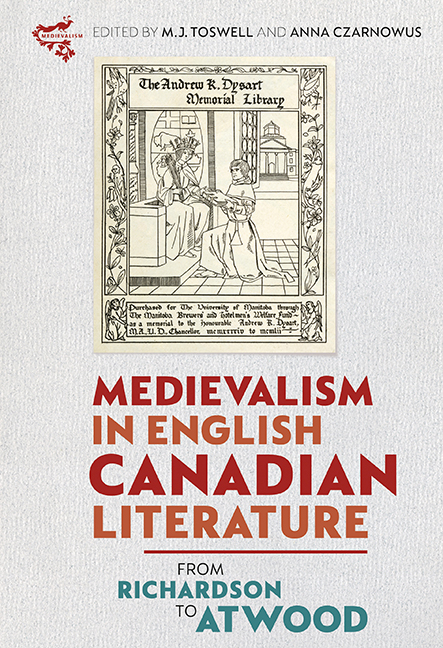Book contents
- Frontmatter
- Contents
- Introduction: English Canadian Medievalism
- 1 “Men of the North”: Archibald Lampman's Use of Incidents in the Lives of Medieval Monarchs and Aristocrats
- 2 “Going Back to the Middle Ages”: Tracing Medievalism in Julia Beckwith Hart's St. Ursula's Convent and John Richardson's Wacousta
- 3 John Richardson's Wacousta and the Transfer of Medievalist Romance
- 4 A Canadian Caliban in King Arthur's Court: Materialist Medievalism and Northern Gothic in William Wilfred Campbell's Mordred
- 5 Orientalist Medievalism in Early Canadian Periodicals
- 6 The Collegiate Gothic: Legitimacy and Inheritance in Robertson Davies's The Rebel Angels
- 7 Earle Birney as Public Poet: a Canadian Chaucer?
- 8 “That's what you get for being food”: Margaret Atwood's Symbolic Cannibalism 129
- 9 Lost in Allegory: Grief and Chivalry in Kit Pearson's A Perfect, Gentle Knight
- 10 Remembering the Romance: Medievalist Romance in Fantasy Fiction by Guy Gavriel Kay and Charles de Lint
- 11 Medievalisms and Romance Traditions in Guy Gavriel Kay's Ysabel
- 12 The Medieval Methods of Patrick DeWitt: Undermajordomo Minor
- Index
- Miscellaneous Endmatter
5 - Orientalist Medievalism in Early Canadian Periodicals
Published online by Cambridge University Press: 25 March 2020
- Frontmatter
- Contents
- Introduction: English Canadian Medievalism
- 1 “Men of the North”: Archibald Lampman's Use of Incidents in the Lives of Medieval Monarchs and Aristocrats
- 2 “Going Back to the Middle Ages”: Tracing Medievalism in Julia Beckwith Hart's St. Ursula's Convent and John Richardson's Wacousta
- 3 John Richardson's Wacousta and the Transfer of Medievalist Romance
- 4 A Canadian Caliban in King Arthur's Court: Materialist Medievalism and Northern Gothic in William Wilfred Campbell's Mordred
- 5 Orientalist Medievalism in Early Canadian Periodicals
- 6 The Collegiate Gothic: Legitimacy and Inheritance in Robertson Davies's The Rebel Angels
- 7 Earle Birney as Public Poet: a Canadian Chaucer?
- 8 “That's what you get for being food”: Margaret Atwood's Symbolic Cannibalism 129
- 9 Lost in Allegory: Grief and Chivalry in Kit Pearson's A Perfect, Gentle Knight
- 10 Remembering the Romance: Medievalist Romance in Fantasy Fiction by Guy Gavriel Kay and Charles de Lint
- 11 Medievalisms and Romance Traditions in Guy Gavriel Kay's Ysabel
- 12 The Medieval Methods of Patrick DeWitt: Undermajordomo Minor
- Index
- Miscellaneous Endmatter
Summary
ONE OF THE persistent myths about Canada is that it is a nation of two solitudes, a country that is divided between the British and the French. As M.J. Toswell and Anna Czarnowus explain in the introduction to this volume, the majority of literary medievalism produced in pre-Confederation Canada drew on the histories and cultures of Britain and France. Yet, as is often the case, the exceptions help explain the rule. The imagined medieval ancestors of early Canadian literature did not always match the demographics of the nation: for example, Scandinavia (and thus Canada's imagined Viking heritage) was a popular topic long before the discovery of L’Anse aux Meadows or substantial Scandinavian immigration to Canada. Even more surprisingly, early Canadians loved to imagine the Middle East. Nineteenth-century English Canadian periodicals published more than a hundred essays, stories, and poems inspired by the region, yet at no point in the century did Canada have a sizeable population with direct connections to the Middle East. This literary relationship was thus one-sided, reflecting desires not to engage with another part of the world, but rather to consume a fantastic, home-grown Orient. The vision of the region that these authors created and disseminated to the English- Canadian public was one that was simultaneously alluringly exotic and dangerously Other – though they kept this danger at a comfortable distance. In some cases, they created distance through genre: romance was particularly popular, perhaps following English author Clara Reeve's 1785 model of romance as something that “describes what never happened nor is likely to happen” to appeal to a predominantly white, Anglo-European settler audience that did not expect direct contact with real Middle Eastern cultures. Other stories accomplished distance through time. Parallel to and reinforcing early Canadian interest in romantic Orientalism ran an even deeper thread of fascination with the medieval world; Canadian periodicals regularly presented their audiences with stories set in both exotic times and places. This fascination was prodigious: to date, I have catalogued more than nine hundred examples of English-Canadian medievalism published in Canada between 1789 and 1900; of these, ninety-four engage with the histories, literatures, or cultures of the medieval Middle East.
- Type
- Chapter
- Information
- Medievalism in English Canadian LiteratureFrom Richardson to Atwood, pp. 83 - 96Publisher: Boydell & BrewerPrint publication year: 2020



